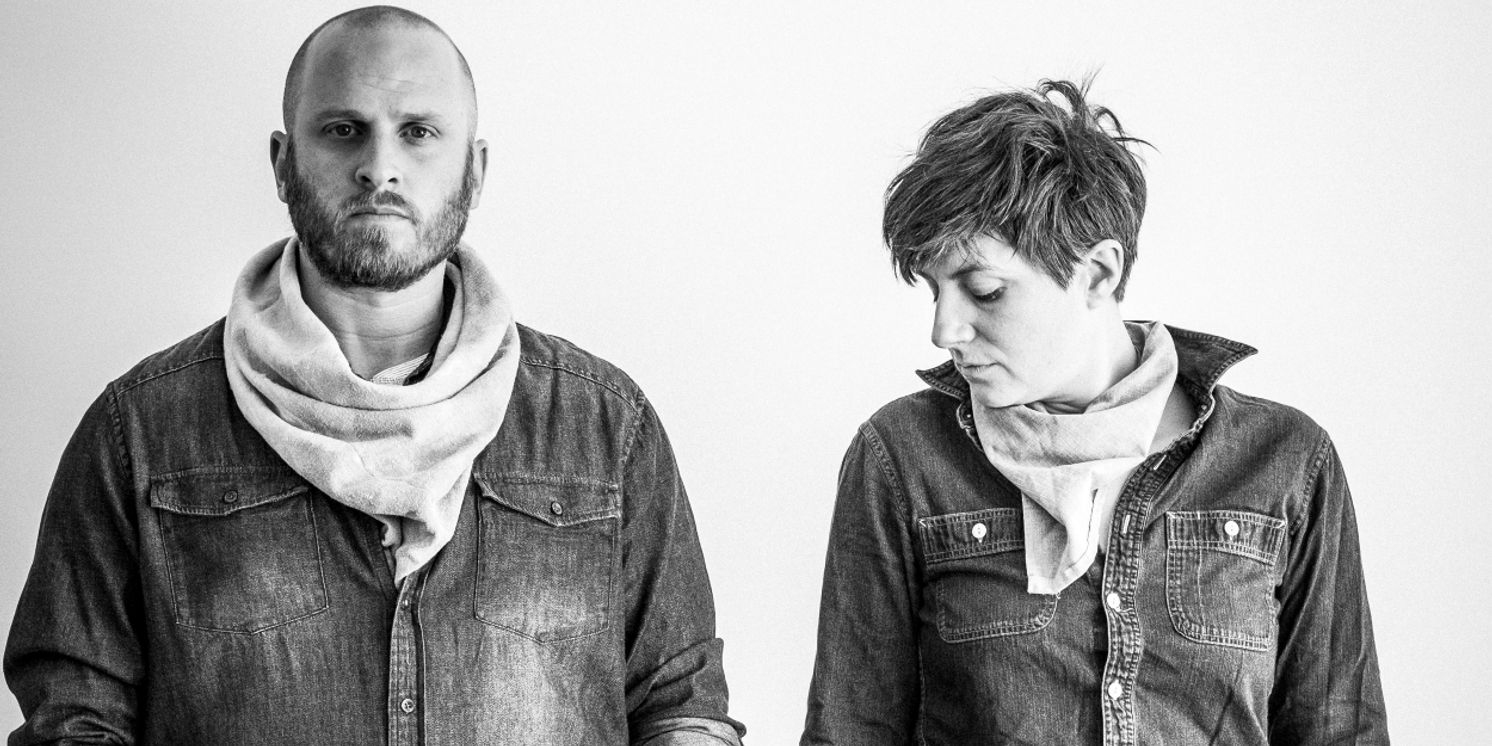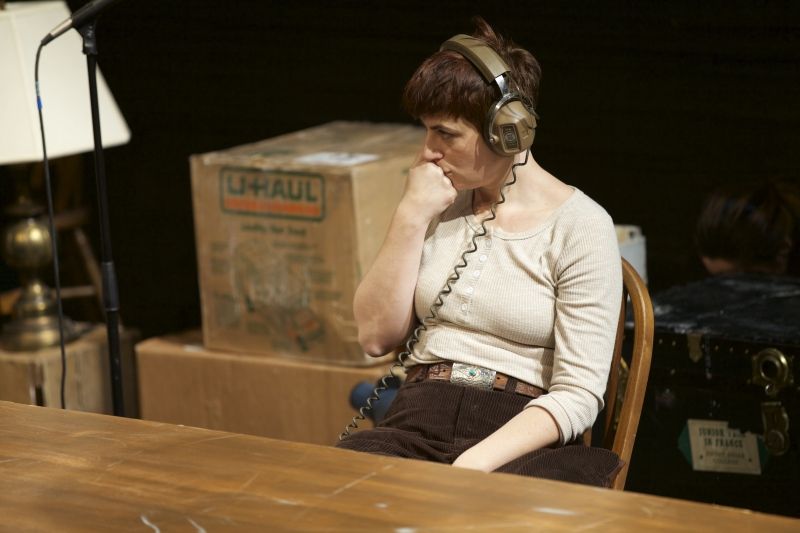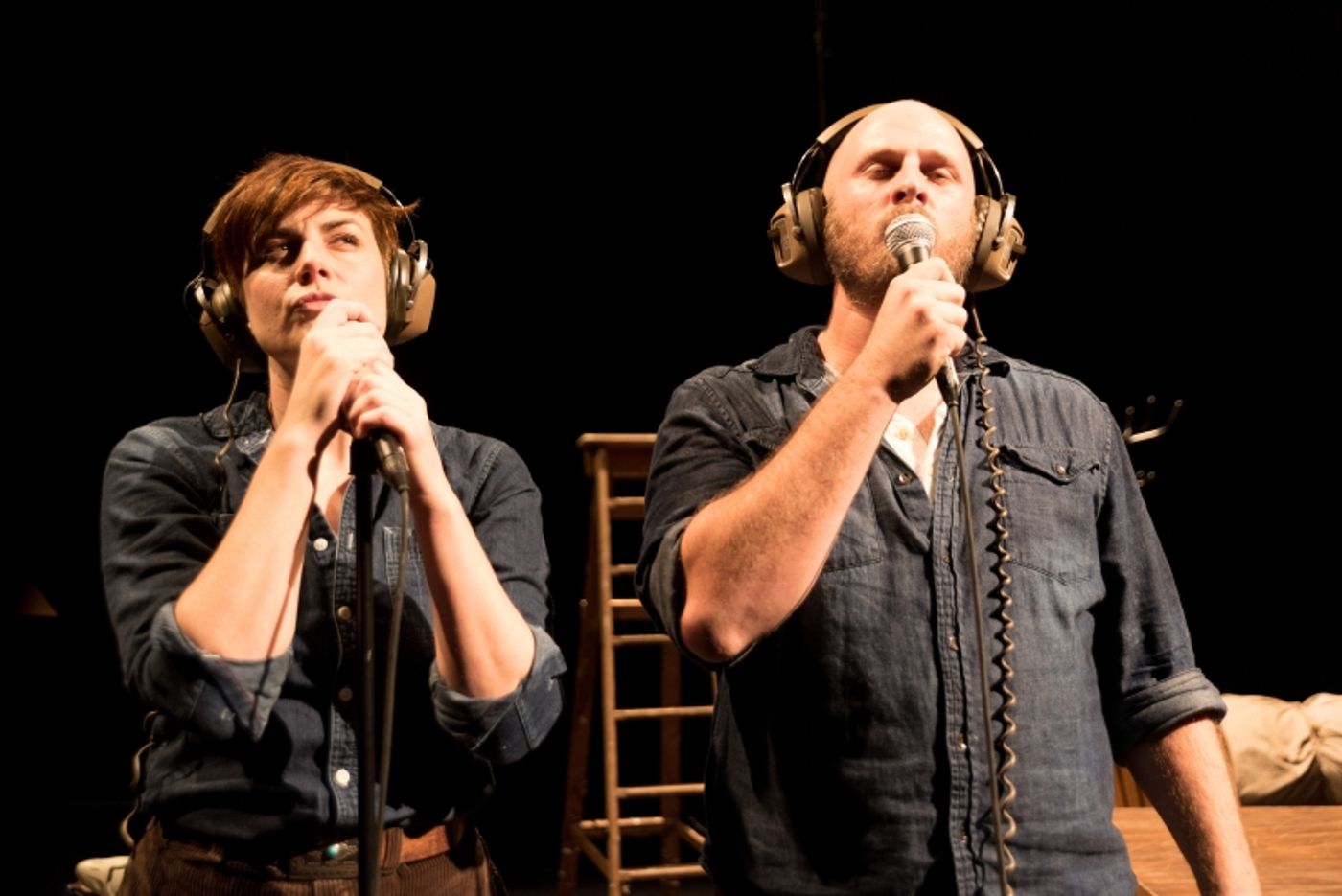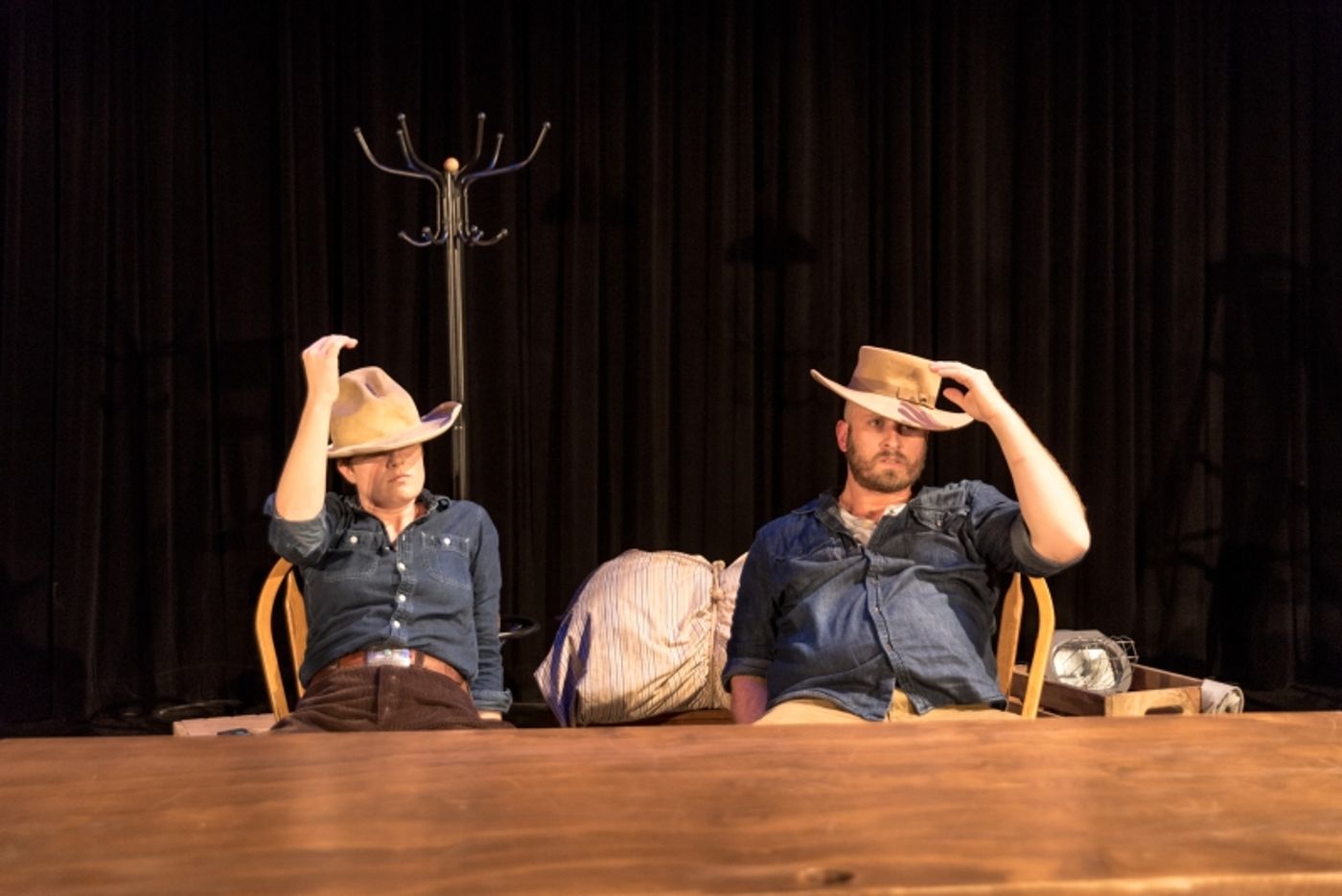Interview: Antigone Meets the Wild West in Annie Saunders and Becca Wolff's OUR COUNTRY
Our Country will run at The Public Theater's Under the Radar Festival, which returns in-person in January.

The Public Theater's 18th annual UNDER THE RADAR FESTIVAL is back in-person this winter after three years, running January 4-22, 2023. The lineup features exciting performances to be presented at The Public, and at five partner venues: Brooklyn Academy of Music, Chelsea Factory, La MaMa, the New York Public Library, and NYU Skirball Center.
Among the lineup of shows is Annie Saunders and Becca Wolff's Our Country. A unique, immersive theatrical work, Our Country melds inspiration from Sophocles' Antigone with imagery of the Wild West and Saunders' personal history to provide a thought-provoking sensory experience. Using recreations of recorded conversations with Saunders' outlaw brother, Our Country digs into our personal and shared history, in order to re-examine the present.
BroadwayWorld spoke with Saunders and Wolff about what goes into bringing a theatrical piece like Our Country to the stage.
The Under the Radar Festival is back in-person after three years. How does it feel for you both to be a part of it?
Becca: It feels great. It's been since 2021 that we've been thinking we were going to get to share Our Country in Under the Radar. We were programmed in the festival in 2021, and that festival went virtual, and then the 2022 festival was cancelled on December 31, ahead of a January 12 start. So, this feels like a homecoming, that feeling that so often we get now, when we're lucky, it's like all of a sudden the world opens back up again. It feels like that to me.
Annie: It's been a long journey. It's been a work in progress since the INCOMING! Series in 2018, and then in January of 2020... It's interesting to think of the context of that as well. Mark Russell, I saw him at UTR in 2020, so that was probably about a month before the closures in Wuhan started coming onto the international press. And he was like, "I think we should do it. I think we should do this show." And it hadn't occurred to me until this moment that I think that might have been a political, cultural kind of feeling that had that inspired him to be like, "It should be this show at UTR in 2021." So, that conversation was in January 2020. And as Becca said, then there was a cascade of cancellation, and here we are.
You two co-created Our Country, and it is incredibly unique, it's autobiographical and inspired by Antigone, can you tell me about the show's development process?
 Becca: We started in 2015 backstage at a theater called SF Playhouse in San Francisco, they're in this gorgeous old theater. So there's a creepy, cool, cave-y quality to it, and when we first started exploring Antigone, we were in residence at SF Playhouse, and they offered us the backstage as the space to present. And the show, we were in an immersive context, the cave is where Antigone ends, she ends her life there.
Becca: We started in 2015 backstage at a theater called SF Playhouse in San Francisco, they're in this gorgeous old theater. So there's a creepy, cool, cave-y quality to it, and when we first started exploring Antigone, we were in residence at SF Playhouse, and they offered us the backstage as the space to present. And the show, we were in an immersive context, the cave is where Antigone ends, she ends her life there.
So, in 2015 we were really exploring the guts of Antigone, which, to us, was the lost brother and this idea of private loss without public grief. We were exploring wordless sound, and repetition, and this feeling of being in the cave, that backstage space, the immersive feeling. We came up with this idea of being in a blanket fort like when you're a kid, and this character, meanwhile, at the center of it, who, Annie, when we first decided to do Antigone, described as in a perfect state of self-belief. So those are kind of the ingredients. It was immersive, it was abstract, and it became this western Antigone by the time we got to the Getty Villa a year later.
Annie: And just to say, before that time at the SF playhouse, the show really started as a conversation with Becca and I about what we'd like to do together. We had met in LA, both directing a series of short play readings at Theatricum Botanicum. I had seen a couple of shows that Becca created dramaturgically, and directed, with a performer, that were written by the performer that were autobiographical, where I just really felt like I could see very clearly that these performers had come with a bunch of loose confessional notes, and that Becca had shaped them into things that were theatrically compelling for the audience, with really the audience in mind, which I related to very strongly artistically.
And so, I said, "What do you want to do?" And she said, "I'm reading this book about Antigone which is called Antigone Interrupted," by Bonnie Honig. That was sort of the beginning when we began to talk about Antigone Interrupted as a convergence of Girl Interrupted and Antigone. I was like, what really speaks to me about Antigone is having a little brother who is kind of a fuck up, that you feel like you have to rescue all the time. And also, I always read Antigone and think, "What would it be like to really believe in yourself that much?" And then another question I had was, what would happen in that cave? It's all sort of off-stage in the play, so what would it be like to be in there? And that's where the idea of the blanket fort came from. When we're children we create dark, enclosed spaces to make ourself feel safe and in control, and when we get older we fear those spaces. So, what does that mean?
What does the collaboration process look like for you two?
Annie: Really, from the very beginning, it mirrored that first conversation of, "I'm interested in this, what are you interested in?" Then, we would go into the room with things to try, or texts to bounce off of each other, or experiments, and that followed a pretty standard, Becca as the director, me as the performer, but with generative ideas going back and forth. And we worked into Antigone in that way, and this idea of origin mythologies of childhood, and the Wild West as the origin mythology of the western United States.
in this, what are you interested in?" Then, we would go into the room with things to try, or texts to bounce off of each other, or experiments, and that followed a pretty standard, Becca as the director, me as the performer, but with generative ideas going back and forth. And we worked into Antigone in that way, and this idea of origin mythologies of childhood, and the Wild West as the origin mythology of the western United States.
There was a lot of Antigone material, and then a lot of material from us taken from Western movies. And then when we went to the Getty Villa in 2016, during the run of the show, my brother, who has had many legal problems over the years, a criminal lifestyle, had a fresh round of felony charges, some of which were for marijuana cultivation, and some of which were for violence, he got in a bar fight and fled the scene, and got a DUI, so there was this kind of new, fresh round of felonies. And Becca suggested that I go up north and make some recordings of us talking to each other about the show, and the themes of the show, and our childhood, and all these things. So, I went up and I made about six hours of tape, and since then, our creation process has been a lot around working into the use of that audio as a script.
Becca: In terms of our collaboration process, a big part the collaboration we have, and I think a lot of artist have is, we have a relationship, we're friends, we are in each other's lives. So having those conversations about family, about what is going on beyond the rehearsal room, beyond the creation room, for me, that feels like the most important moment of the process. Where do we open those doors? And when do those moments come where it feels like, creatively, sharing something that's very real and very difficult, where can we make that conduit between, in this case, Annie's experience, our experience together, processing that personally, and an audience who is looking for, I hope, more truth, or deeper connection to, not just the definition of humanity, or the observance of humanity, this interpersonal, confessional, intimate kind of storytelling.
The producing piece, we partnered with Octopus, which is a production company and they do many bigger shows than ours, and it was really exciting to step into this partnership with them because of their ability to imagine what we imagine, and make it real.
What can audiences expect to see when they come see Our Country?
 Becca: We come from very different schools of theater-making, and mine is, for lack of a better term, traditional, American realism, and Shakespeare, and Annie's coming from this more immersive, experiential world. So, one thing that we talked about in the beginning, is every single thing in the show, any object, any word, any speech, any interaction, has many meanings at once, a constellation of meanings. So, the idea that you should land on what any one thing means doesn't jive with what this piece is.
Becca: We come from very different schools of theater-making, and mine is, for lack of a better term, traditional, American realism, and Shakespeare, and Annie's coming from this more immersive, experiential world. So, one thing that we talked about in the beginning, is every single thing in the show, any object, any word, any speech, any interaction, has many meanings at once, a constellation of meanings. So, the idea that you should land on what any one thing means doesn't jive with what this piece is.
So, for instance, you have Annie in a cowboy hat speaking Sophocles text while carrying around this giant man on her shoulders. These are all immediate, visceral, familial relationships feeling the weight of your brother on your literal shoulders; cultural histories, so Antigone being something that's going to speak through you when you feel a certain type of emotions; and Westerns, for the moment we're in in America where we're doing all of this unearthing of the violence of our past and going through this mythologizing of the rugged individual in the cowboy hat who's actually destroying things.
Annie: One thing I can say in terms of what audiences can expect is Bonnie Honig used this word palimpsest, when things have been painted on top of other things, layers of the originals are showing through and impacting what's on the surface. I think that's what audiences can expect, a theatrical palimpsest. It's very hard for me to know what the audience experience is like, but I do think it is really a place that they visit. I think that they come into a place that we have made, and we really bring them into it. This fort goes over the audience and they live inside of it for that hour. It has the three-dimensionality of a destination. That thing about every single aspect has multiple meanings, it's like we haven't decided necessarily what those things mean.
There was a question in one of our Q&A's that was like, "What does it mean that you carry him?" It's meaningful, it means a lot of different things, it means burden, it means male vulnerability, it means all these different things, but in our process, anything that means one thing is out. It has to have that multiplicity of meaning to have a place in this world.
What do you hope that audiences will take away from Our Country?
.jpg?format=auto&width=1400)
Becca: We had this experience where someone in the audience at New York Stage and Film appeared fancy, she was a fancy lady, and she said this thing about fighting with her brother, and remembering how she was like an animal as a child. The physicality of the way we fight. There is a question in the show of, "Do you have a sibling and what was your relationship like?" We do interviews with the audience. The interviewer doesn't say, "Tell me about violence," But almost exclusively, someone's story is like, "My sister slammed my finger in the door." So, this woman who is fully civilized, is in the audience of our show, saying, "This show made me remember how I was an animal to my brother, and I haven't spoken to him in many years, and when I think about why I haven't spoken to him, I think about that time. Right now, because of your show."
Annie: And that doesn't necessarily just mean brutal, or violent, it's animal. Primal, soft, with all of it's basic universal needs of a living thing on the surface. And that feels so important, to be together in a space with a collective memory of that.
Becca: Politically, we ask all the time, "Why are we so divided?" We're divided, period. We don't agree. And I think that what the show offers is this fort in which to meet with those you don't agree with and be like, "We are not our clothes, we are not our politics, not always," And so, what were those things that were soft, were raw, were primal, before we attached all these ideas of what we think about abortion, or race, with the people that shared our experiences, our siblings.
Annie: I think that, for me, when I was thinking about Antigone and rescuing this brother, and feeling this obligation, and so on, I felt like a sibling is a really unique specter of who we were at our most primal. Because on our own we can be this sophisticated, individuated, civilized, intellectual person, and then this sibling comes along as a grown up, and on some level, even if we're talking about something else, the presence of, "You threw me down the stairs for a bag of jelly beans," you did that. That is there in the conversation, that layer, that palimpsest, the feral self showing through is present in the relationships with the people who were little when you were little, in your house, in a way that I don't think any other relationship can hold. So, I hope the show gives us an acquaintance with who we used to be.
Videos

